2021 Mini Electric LCI 2 review: The electrifying hyper-speed Hatch
When electrifying a retro-icon, you’ll always run the risk of ruining the model’s characteristics. After all, the visceral feel of a throbbing Internal Combustion Engine is what makes so many classic and retro-type cars iconic.
But Mini is not your ordinary retro-tribute brand. This is a marque that can alter the basic formulation of what makes their cars special, without compromising on the fundamentals of their history.
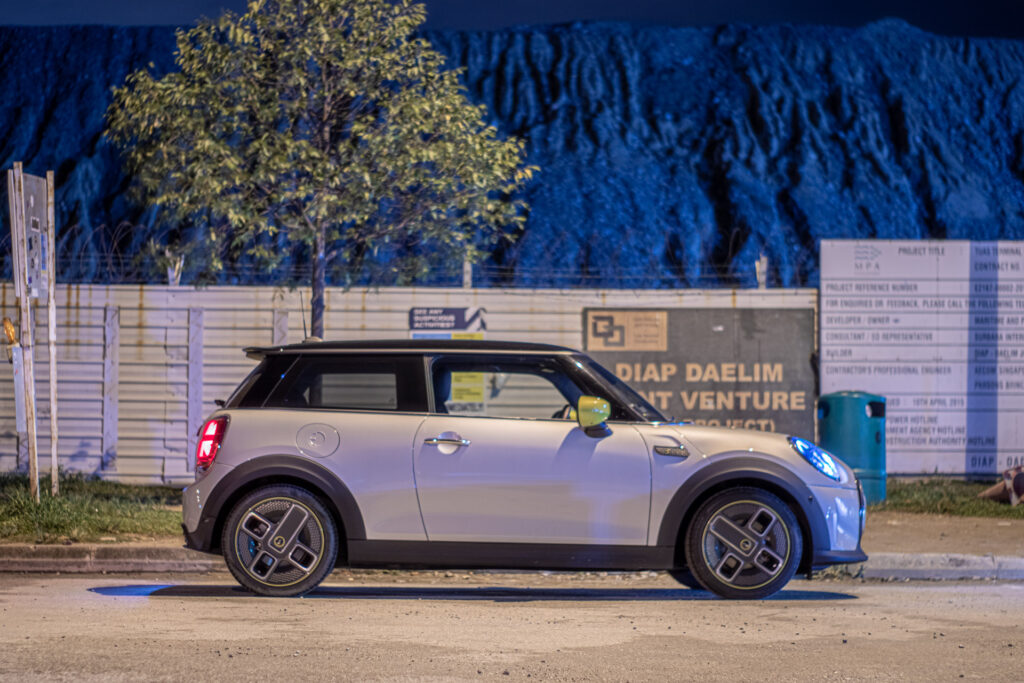
Basically, they can manufacture models that may look and feel like a Mini, but may not have the Mini-levels of performance that you’ve come to expect from them.
And that’s what we really like about Mini’s approach to electrification.
Understanding the Mini Electric
It’s refreshing to see a marque that doesn’t feel the need to shout about its green credentials. The Mini Electric is very much a Mini first, and an EV second.
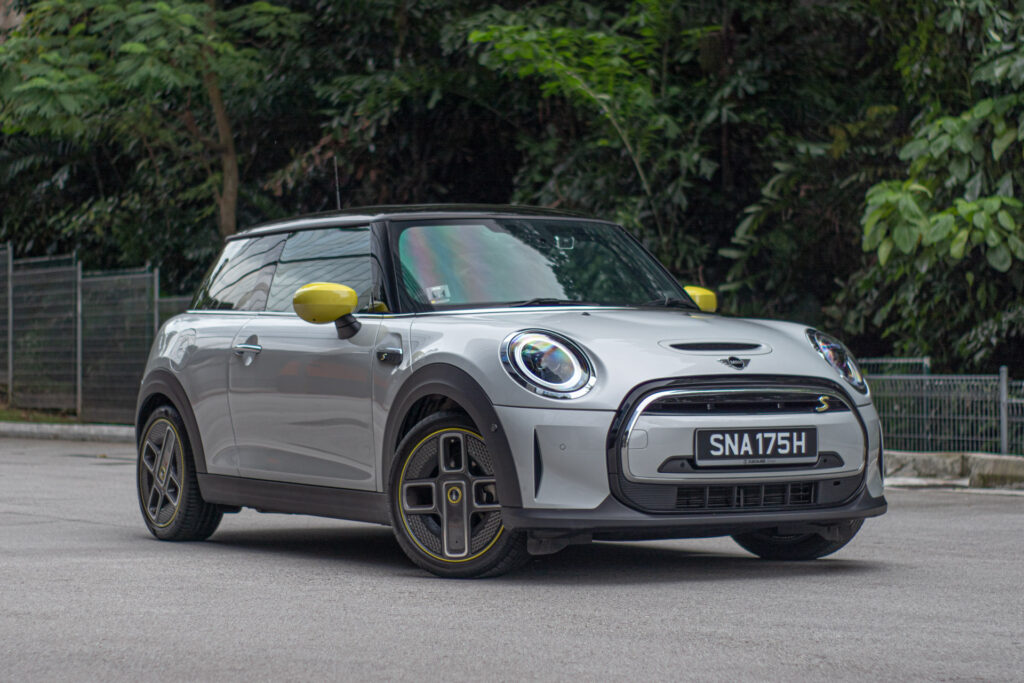
In simple English, what this means is that whilst the ‘Electric’ bit of its moniker is a key part of its identity, the car isn’t fully consumed by it. It still looks and feels very much like any other MINI model in the market.
Life Cycle Impulse 2…
…or LCI2 in BMW speak, is essentially a follow-up to the original mid-life facelift that all BMW Group cars undergo. Whilst uncommon (most cars only have one major facelift before being replaced), it can be a way to keep the cars competitive, without having to prematurely introduce its successors.
Unlike the previous MiniElectric, which had a front end that had some key design differences to its petrol brethren, Mini opted to visually realign all their cars, bar the JCW version, with very similarly-styled front fascias.

Most of the front grille has been blanked off for aerodynamic purposes. There is a bonnet scoop, but we can report that it doesn’t actually lead anywhere and is purely for looks. Save for a neon green ‘S’ badge, you’d be hard-pressed to tell that this is an EV.
There’s a pseudo-diffuser running the width of the rear bumper. Again this is likely for aesthetics, as it appears to be blanked off, and unlikely to actually yield any tangible aerodynamic benefit.
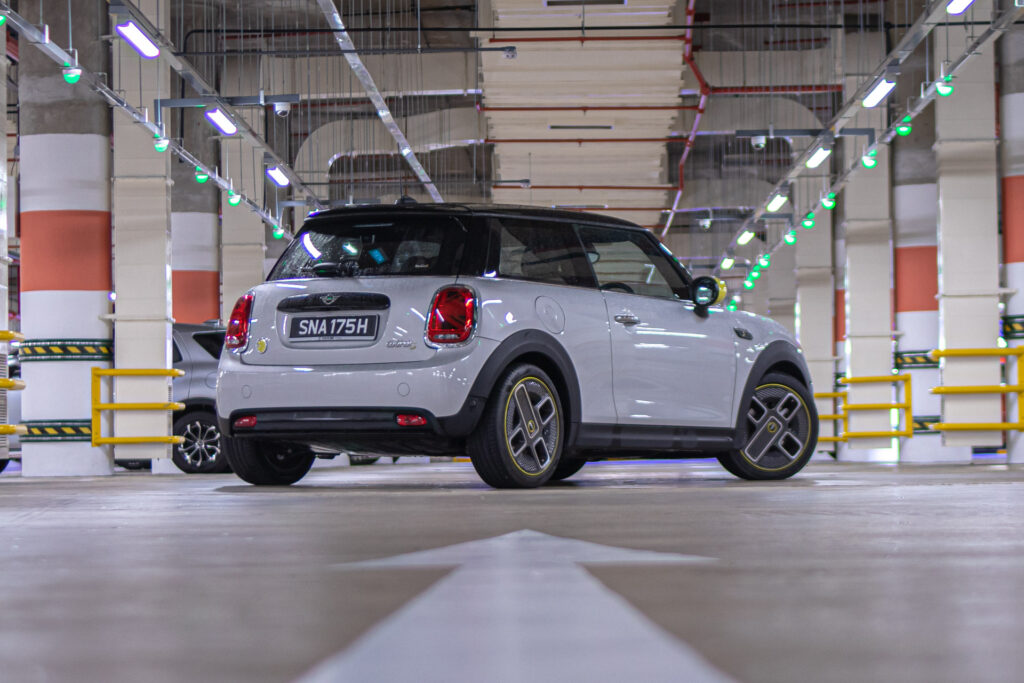
This EV makeover is so well done that if you’re looking at the bodyshell alone, you’d not be able to tell this was electric. Until at least you spot the missing exhaust pipes. But that’s sort of the point!
Externally, the wheels are actually the biggest giveaway that this is no ordinary Mini Hatch. The aerodynamic wheels are designed to reduce drag and are clearly inspired by the UK 3-Pin power socket that we happen to use in Singapore too.
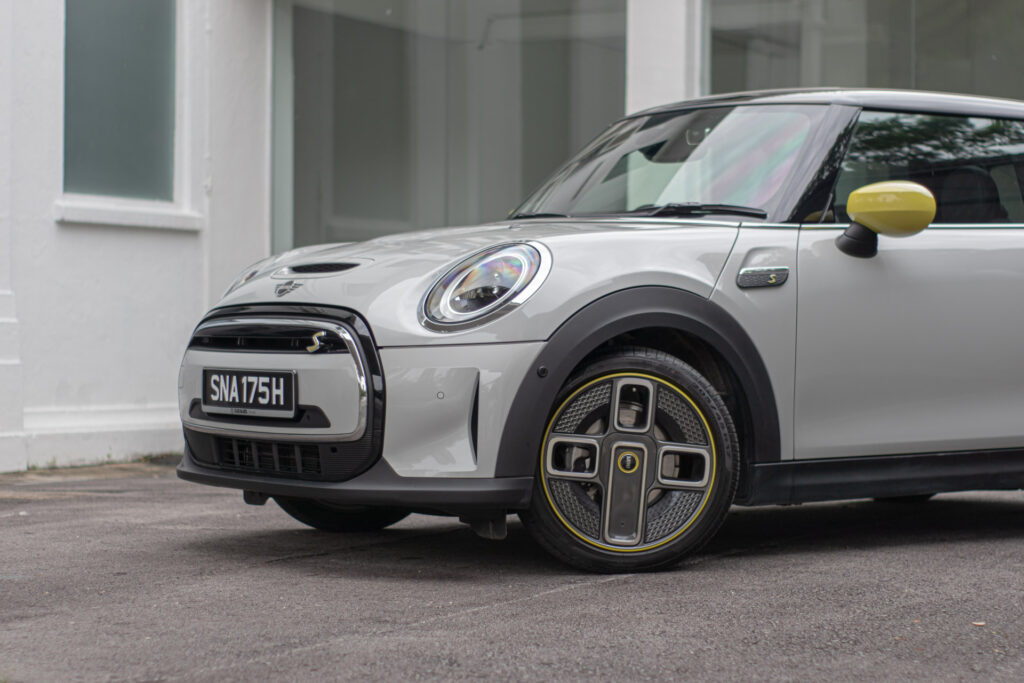
It’s a smart-looking car and definitely looks like it’s worth what Mini wants for it.
It’s business as usual on the inside…
For the most part, there’s little to distinguish the Mini Electric from any other Mini in the company’s catalogue. The LCI2 facelift brought with it an updated infotainment system and a set of digital dials, which are standard across the range.
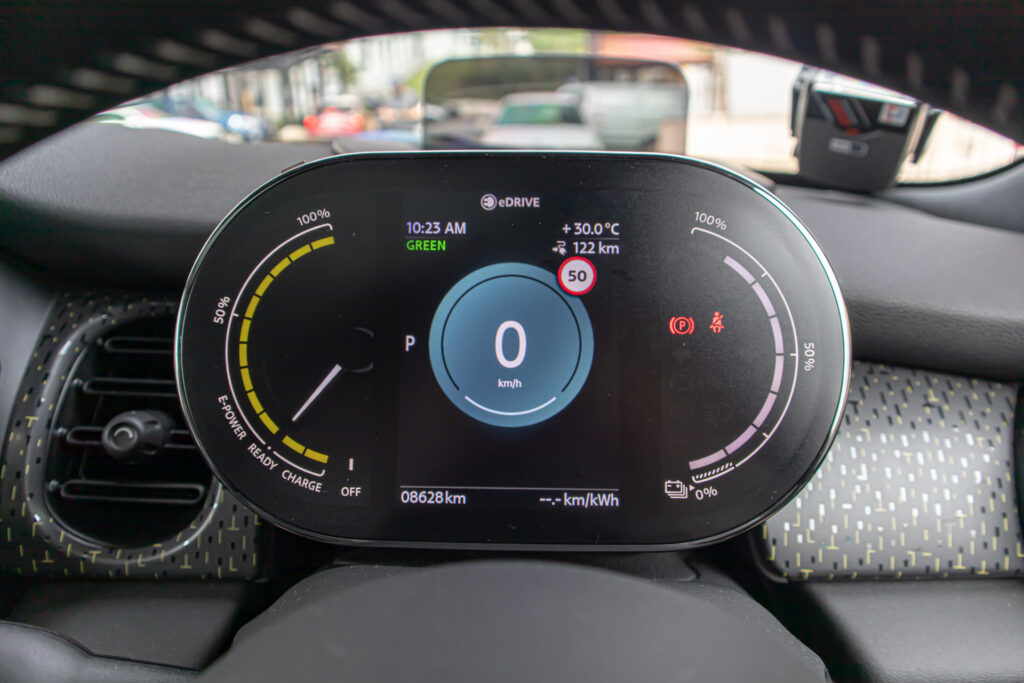
As with the other cars in this LCI2 facelift, the Electric receives the same funky instrument cluster. It may look like a fully-digital cluster, but only the central portion is actually a screen – the power meter and battery gauge are analogue units.
Overall though, it very much is the sleek black aesthetic that helps to sell the illusion.
An 8.8-inch infotainment screen nestles in the now-iconic round bezel that dominates a modern Mini’s centre stack. You can control this via the touchscreen itself, or through pre-set shortcut buttons on the stereo unit.
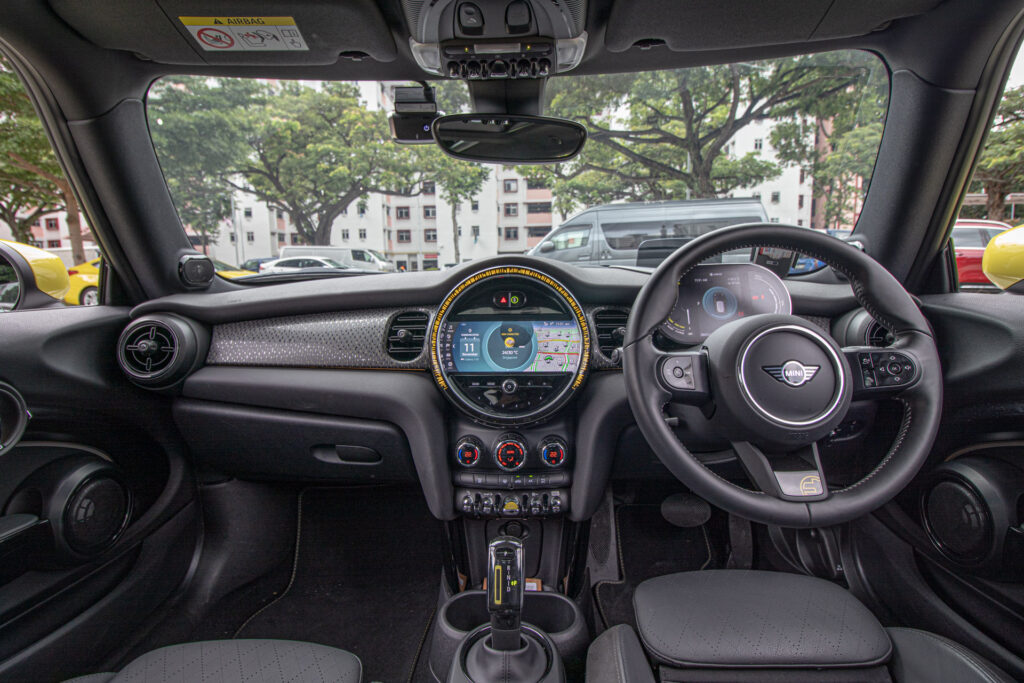
If you so choose, there’s a BMW iDrive-style control panel in the centre console. You can use this to toggle between the stereo settings and apps as well. Wireless Apple CarPlay is available, but Android Auto isn’t.
Though with its native navigation, you can still plot your route on the infotainment screen if you own a non-Apple smartphone.
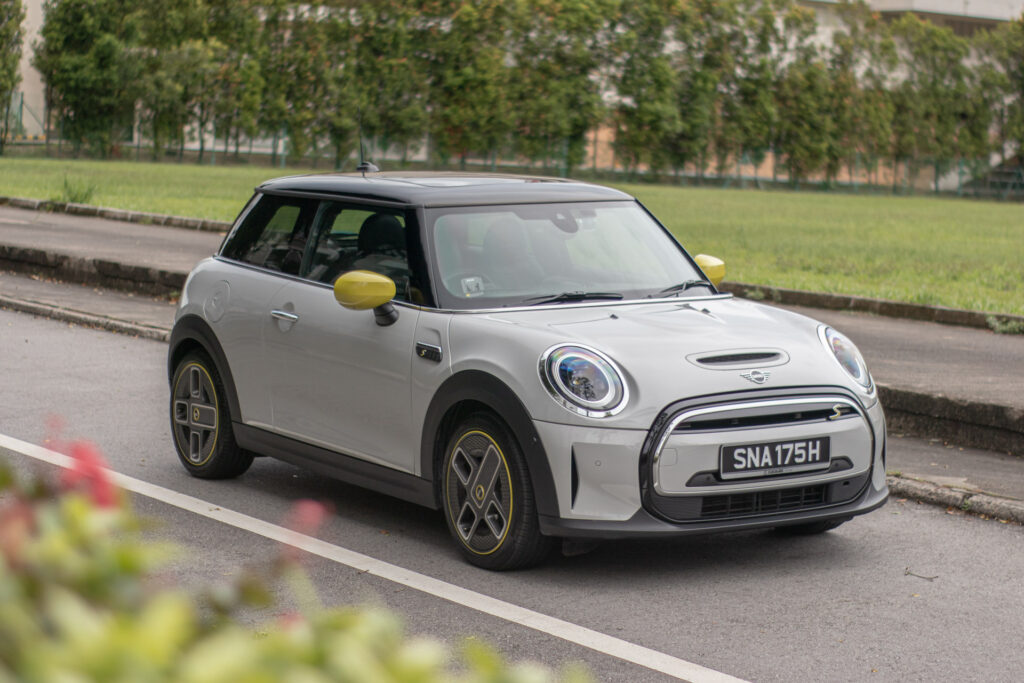
Minis have always been the masters of packaging. There’s sufficient room for a family of four in this vehicle. Space, both physical and perceived, is of no short supply upfront. The sunroof helps allow sunlight to flood the front of the vehicle, making it feel larger than it really is.
Whilst the rear footwell may look small, the seat bases of the front seats are actually fairly high up in relation to the floor pan. This means that you will be able to slide your feet underneath the front seats. Knee room is still of a premium though.

Even so, you can just about comfortably fit two adults in the rear seats.
And speaking of space, there’s little change to the rear metalwork of the MINI Electric, so you’ll still get the same 211 litres of cargo capacity as with other MINI Hatch models.
Electrifying performance
The Mini Electric handles like what you’d expect a Mini to drive like. With a well-weighted and sharp steering wheel, the front end feels responsive and confidence-inspiring regardless of the mode you decide to put the car in.
Couple this precision with suspension that is sporty, yet still surprisingly supple over bumps, and you get an amplification of this car’s playful, go-kart-esque characteristics.
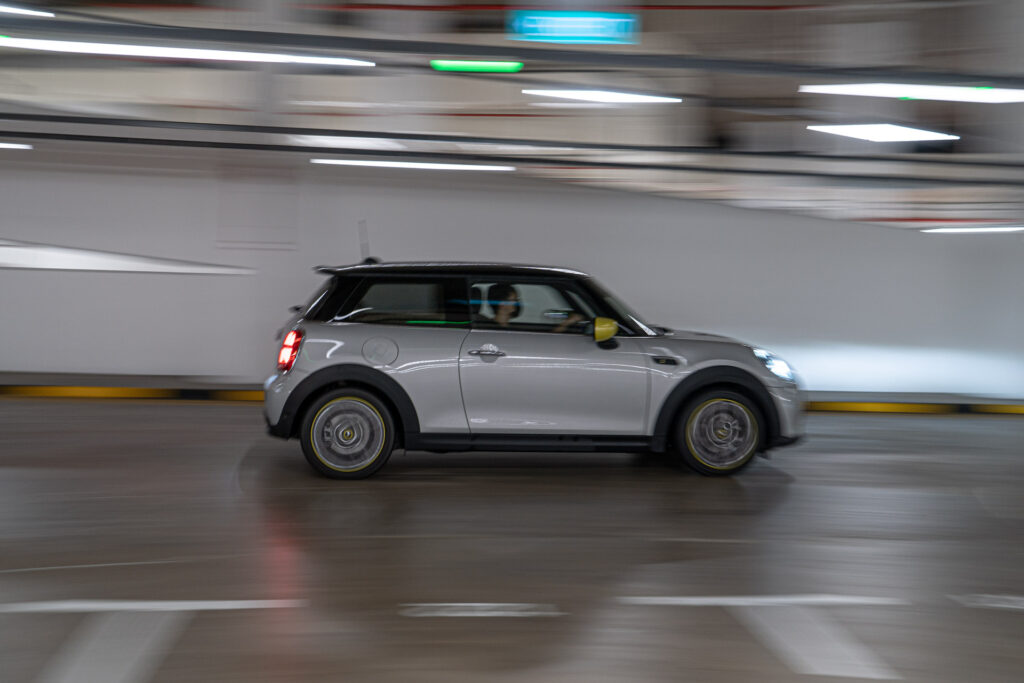
When testing the Mini One, we felt that this sharp front end was a touch twitchy on the expressway. At sustained high speeds, the car does feel nervous.
Whilst the handling characteristics of both cars are very similar, the extra 200 kilograms gained by the Electric in its EV conversion means that it actually feels more stable on the expressway.
The Electric, therefore, is actually a better all-rounder from a handling perspective.
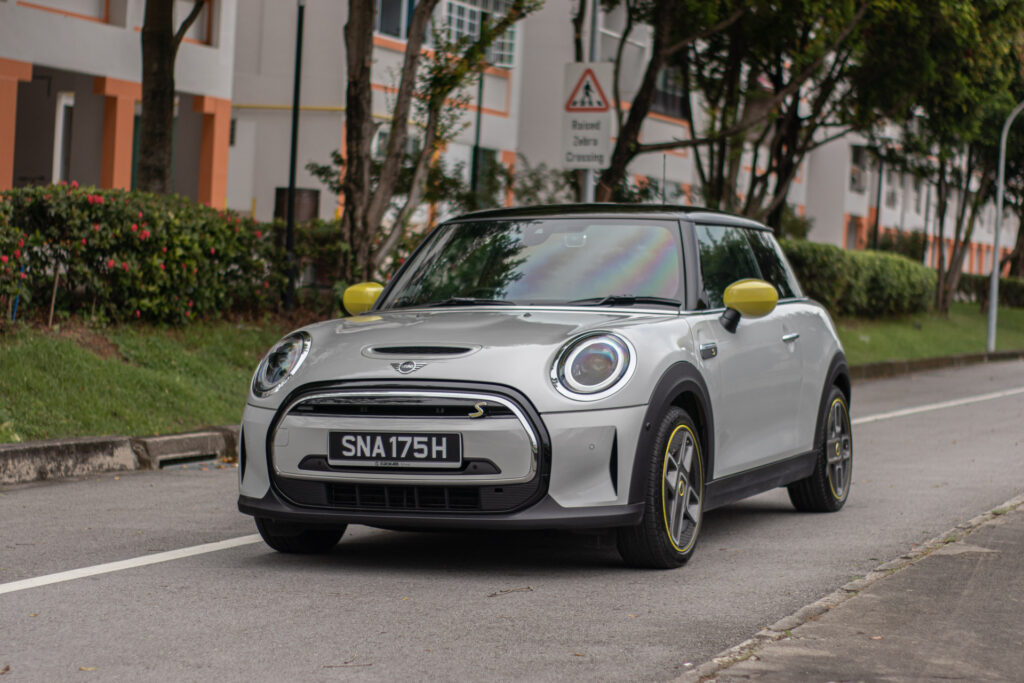
Let’s take a look at what contributes to the weight increase.
Mini has filled the transmission tunnel and the rear fuel tank space with batteries, for a total capacity of 32.6 kWh. Upfront, you’d find a BMW i3-sourced, 181bhp electric motor.
As these components are mounted fairly low down in the chassis, the electrification process actually accentuates the characteristics of this chassis – the centre of gravity feels lower than the equivalent petrol Mini.
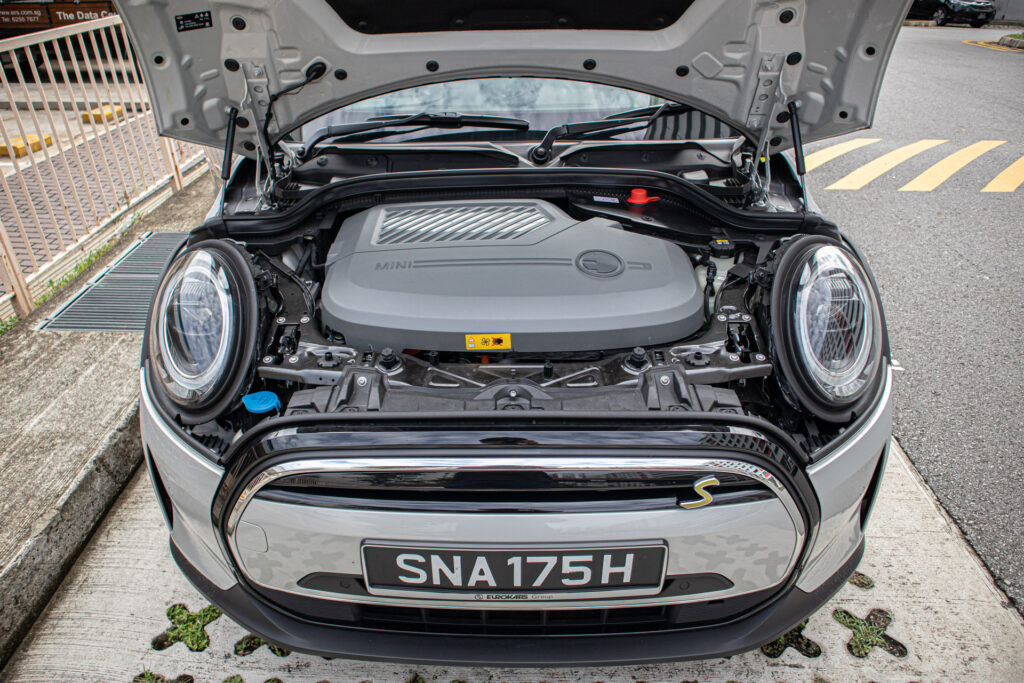
As the power is available the instant you touch the throttle, we found little issue filtering or merging lanes, even on busy roads. In traffic, the accelerator feels like a warp speed button. Even just thinking about where you want the car to be, and somehow you’ll find yourself in that gap, in a state of utter disbelief.
A riced out COE ‘beng’ mobile? This Mini will leave it for dust.
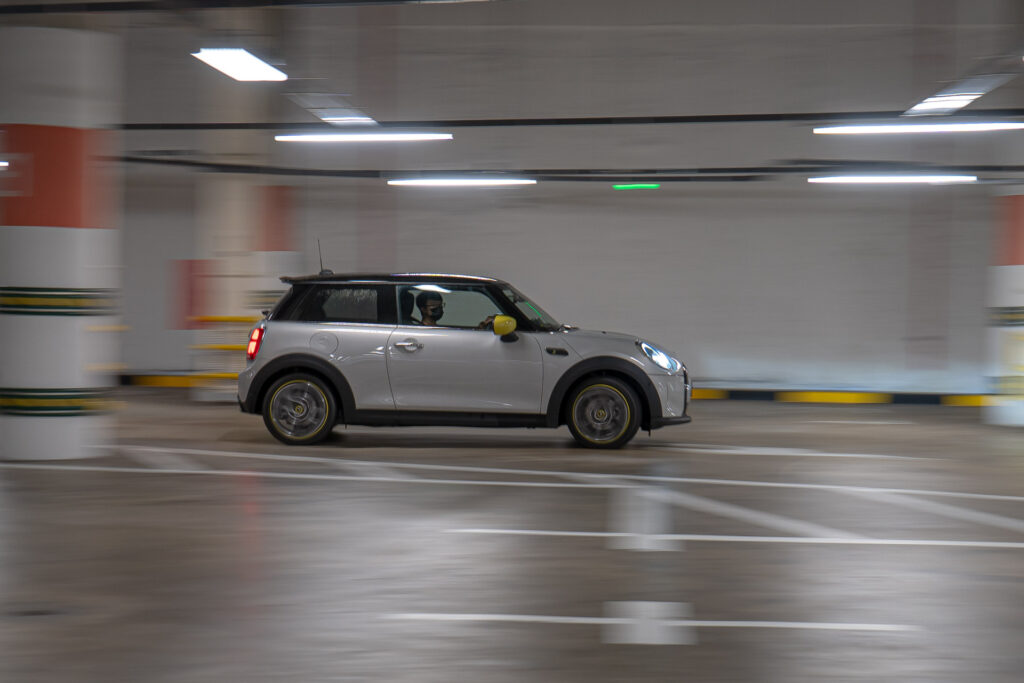
In terms of efficiency, Mini claims that the Electric will do 5.7km/kWh, for a total range of 234km. In our test, we achieved around 6.8km/kWh, with an estimated total range is around 150km.
You can put the Electric in one of four driving modes. They are Sport, Mid, Green and Green+.

Sport gives you unfiltered access to all of the 181bhp the Mini’s motor has to offer. The throttle response is nervous, and the car is eager. A twitch on the throttle and you’ll find yourself right on the bumper of the car in front. The steering weights up, and it really does feel like an oversized go-kart.
Mid reigns in the power delivery for a smoother drive. This is what we’d recommend for daily driving.
Green and Green+ are designed to stretch out the car’s range. The former just dulls the throttle response, the latter going as far as disabling the aircon for maximum electrical savings.
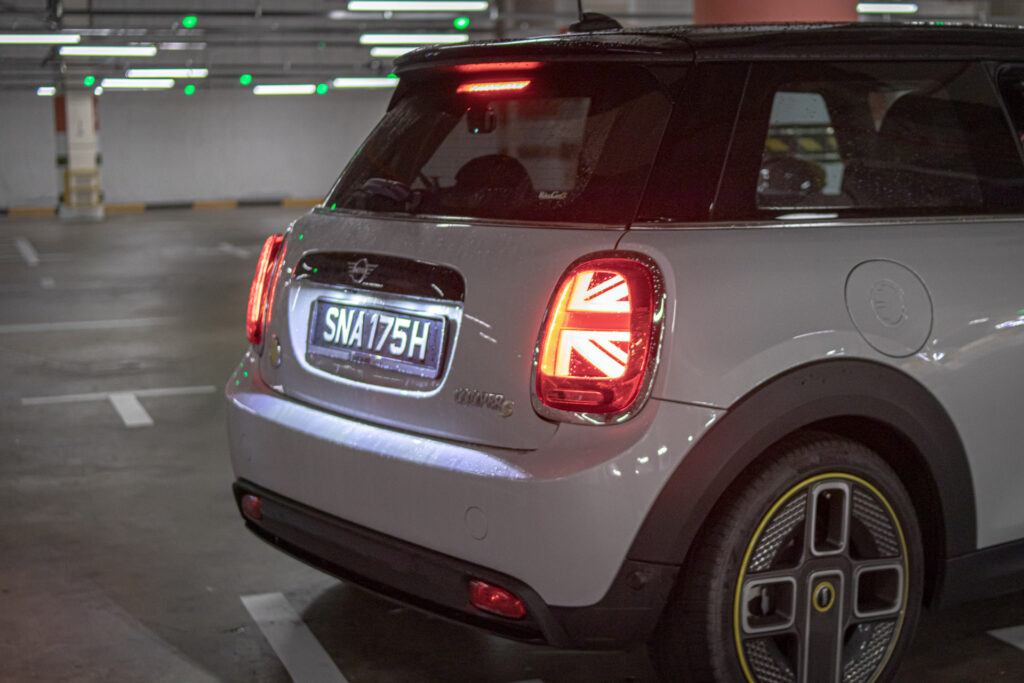
Regardless of the driving modes though, as with most EVs, turning its traction control off and stomping on the loud pedal will yield a shriek from the front end, as the instantaneous torque overwhelms the grip on offer.
Even on wet roads and with traction control off, hard flinging the car around empty strips of tarmac didn’t make it feel like it was out of control.
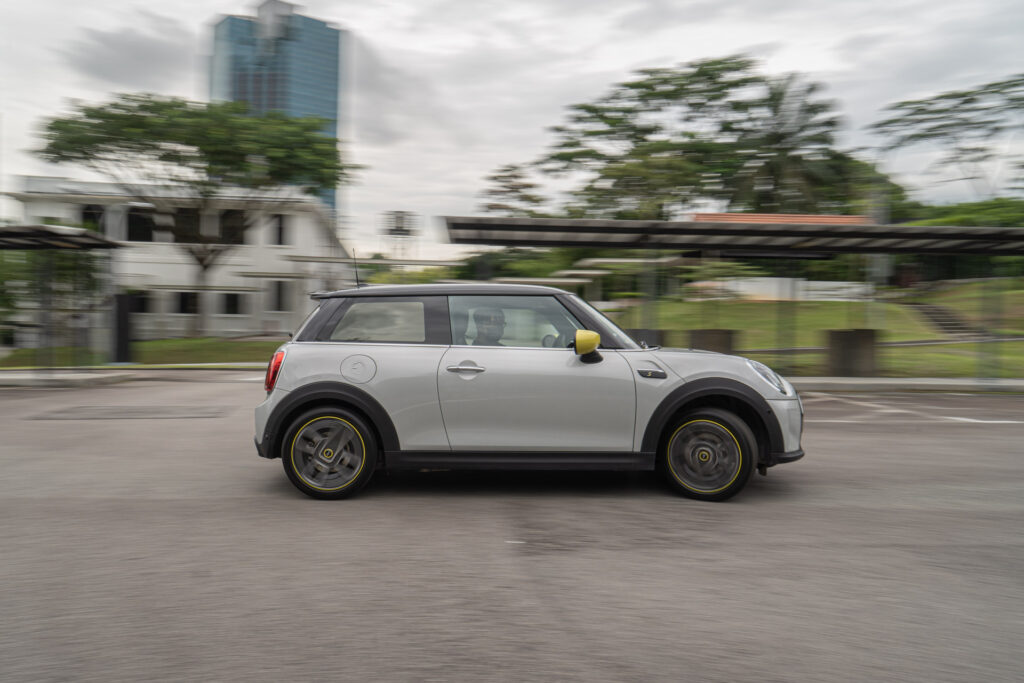
Realistically though, you aren’t going to be driving this hard on a regular basis. Around town, you will find yourself doing quite a bit of one-pedal driving. By default, the car is in its more aggressive regenerative braking setting. When you lift off the throttle, it is as though you’ve slammed on the brakes hard.
Unless you are going significantly over the speed limit, you can rely on just this to stop the car. However, one drawback of the regenerative braking is reduced pedal feel on the brake pedal.

Master the throttle though, and you’d be rewarded with a smooth drive and longer range. Whilst it works like you’d expect moving forward, it’s the braking bit of the equation that can be hard to wrap your head around if you have had no prior experience with EVs.
We used to think that power meters in EVs and Hybrids were a bit of a gimmick. But the unit fitted to the Mini Electric feeds you information about where your throttle position needs to be.

To control the rate of deceleration, you would want to essentially manipulate the throttle to let the car coast. Keep the power meter on your cluster in the ‘Ready’ position for this. As you are preparing to come to a complete halt, gradually feed in the regen braking by lifting off the accelerator.
You’ll only have to use the friction brakes when stopping at a significant rate of speed.
Warp speed
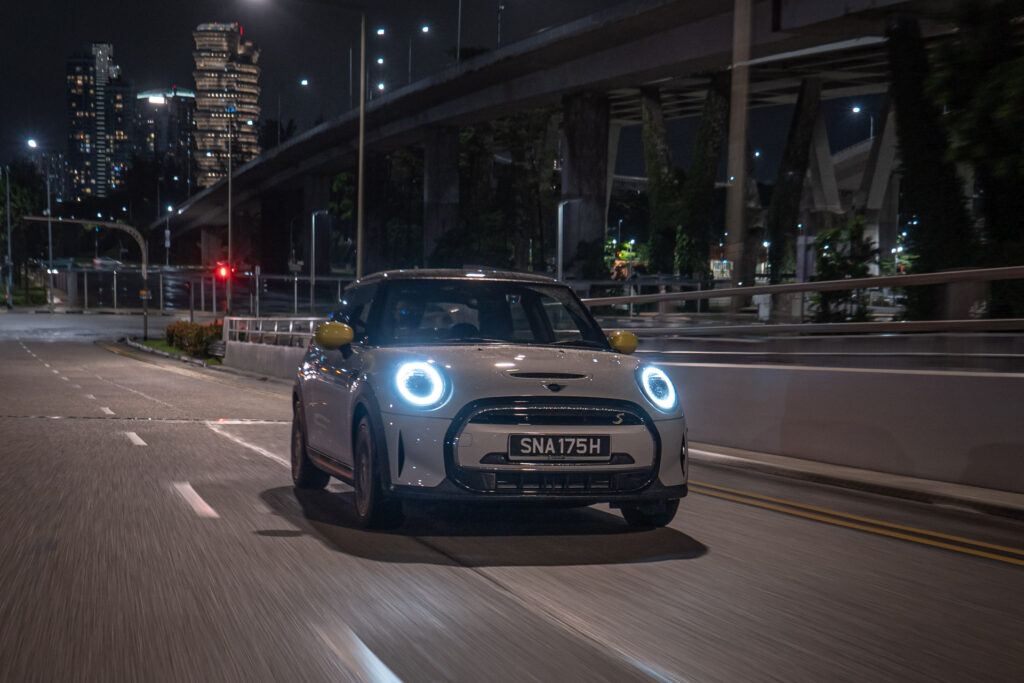
What we really like about the Mini Electric is that it really is just a capable, premium hatchback that is comfortable and nice to drive. It doesn’t feel the need to shout about its green credentials.
If you’re wondering about charge times, a charge from 20 per cent to 80 per cent will only take you 30 minutes. This is enough to give you an extra 120+ kilometres based on our testing.
Whilst not advertised as such, it really is just a hot hatch that just so happens to have an electric motor. And that’s the key – the electric part, whilst playing a huge role in the car’s character, isn’t in its totality. The overall Mini experience – that’s what’s up!
Find out more about the Mini Electric or book a test drive at Mini Singapore.
Specs
| Price: | S$195,888 (inclusive of COE) |
| Performance: | Engine: Asynchronous Electric Motor
Power: 181bhp Torque: 270Nm Efficiency: 5.7km/kWh Range: 234km 0-100km/h: 7.3s Top Speed: 150km/h Brakes (Front): Ventilated Disc Brakes (Rear): Disc |
| Measurements: | Wheelbase: 2,567mm
Dimensions (LxWxH): 3,845mm x 1,727mm x 1,432mm Boot Capacity: 211 Litres , |
| Features: | Apple CarPlay
Driving Assistant with Person & Approach Control Warning Lane Departure Warning with Steering Vibration MINI Driving Modes Nappa Leather Steering Wheel Sports Seats Tiredness Warning |











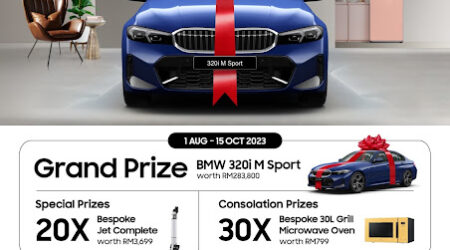
Leave a Reply